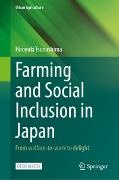Read more
This open access book is about a recent movement toward the “partnership between agriculture and social welfare” in Japan, which has been based on the idea that the shorthanded agricultural sector offers job opportunities to the people excluded from the existing labor market. The question “why agriculture for social welfare?” is worth exploring in an international context. The book examines the results of an action research project initially oriented toward agriculture-related job creation for the homeless elderly and the jobless youth, most of them urban residents. The earlier chapters analyze the relationship among humans as well as between humans and nonhuman life forms on farms, which are essential to understanding of farmwork and the problems in the mainstream labor market. The following chapters highlight the distinct characteristics of the movement based on lessons from this project, resulting in a critique of the welfare-to-work regime and conventional employment assistance. Reviewing literature on the overseas equivalent, care/social farming mainly from Europe, the final part attempts to provide an answer to the question above from a new angle, arguing that work done for the care of life must be delightful. The present study also contributes theoretical support to cognitive science, philosophy of mind, anthropology, politics, and social work science.
List of contents
.- 1.Introduction: A Theoretical Challenge in Justification of the “Partnership Between Agriculture and Social Welfare”.
.- 2.The Significance of agriculture-related job opportunity creation.
.- 3.Analysis of the human-plant relationship in agriculture-related job opportunity creation.
.- 4.Further challenges in the partnership between agriculture and social welfare sectors.
.- 5.What is it to enjoy observing the growth of crops or aesthetics?.
.- 6.In light of research on social/care farming: what deserves international communication.
.- 7.Conclusion.
About the author
Dr. Tsunashima Hiroyuki is a researcher affiliated with Urban Resilience Research Center, Osaka Metropolitan University, and a member of the board of directors in the Japanese Society of People-Plant Relationships. He has conducted an action research project toward agriculture-related job creation for the people facing poverty or social exclusion in urban settings for more than 10 years. Since before, he was involved in grass-roots activities to support homeless people in Osaka. And besides, based on his own fieldwork conducted from 2002 to 2006, he published his doctoral thesis titled “An Alternative Way of Agricultural Development by the Koya People in Andhra Pradesh, India” (Rubi Enterprise: Dhaka, 2012). Presently (as of 2025), he has launched a new research project to phenomenologically review horticultural therapy, which may have influenced practitioners’ perspective, not only enhanced clients’ well-being. He also pays close attention to the lack of political awareness that may lead to eugenic ideas and ultranationalism in the context of organic farming.
Summary
This open access book is about a recent movement toward the “partnership between agriculture and social welfare” in Japan, which has been based on the idea that the shorthanded agricultural sector offers job opportunities to the people excluded from the existing labor market. The question “why agriculture for social welfare?” is worth exploring in an international context. The book examines the results of an action research project initially oriented toward agriculture-related job creation for the homeless elderly and the jobless youth, most of them urban residents. The earlier chapters analyze the relationship among humans as well as between humans and nonhuman life forms on farms, which are essential to understanding of farmwork and the problems in the mainstream labor market. The following chapters highlight the distinct characteristics of the movement based on lessons from this project, resulting in a critique of the welfare-to-work regime and conventional employment assistance. Reviewing literature on the overseas equivalent, care/social farming mainly from Europe, the final part attempts to provide an answer to the question above from a new angle, arguing that work done for the care of life must be delightful. The present study also contributes theoretical support to cognitive science, philosophy of mind, anthropology, politics, and social work science.

